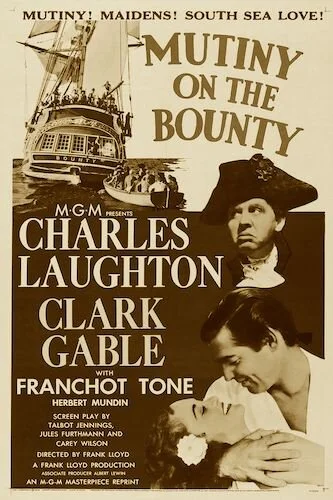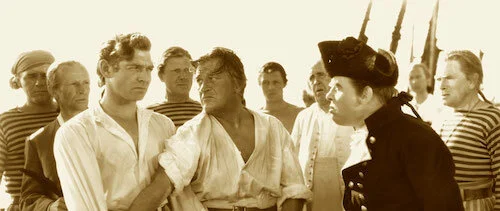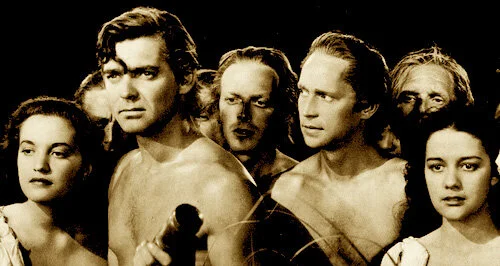Mutiny on the Bounty
This review is a part of the Best Picture Project: a review of every single Academy Award winner for the Best Picture category. Mutiny on the Bounty is the eighth Best Picture winner at the 1935 Academy Awards.
Often (correctly) considered the best adaptation of the novel by Charles Nordhoff and James Norman Hall (which, in turn, is based on a real trial), Frank Lloyd’s Mutiny on the Bounty is a high-stakes battle between disgruntled parties. We have a much stronger film by Lloyd (much better than his previous Best Picture winner Cavalcade), mostly because Mutiny is a focused feature. We know the film is about a mutiny; I mean, it’s in the title! Lloyd and company take their time to boil the pot before we get there, though. You truly see tensions rising between authoritative figures and the ship’s scrubs, and it’s the kind of development that dishes out a great payout. Cavalcade had no idea how to move from one point to the next. Mutiny dove all the way in to each chapter, and made every moment meaningful.
You need a good cast for this kind of theatrical epic. Mutiny had such a good cast, the film overcrowded the Best Actor category (Clark Gable, Charles Laughton, and Franchot Tone, all of whom lost to Victor McLaglen in The Informer); this resulted in the creation of the Best Supporting categories from here on out, as to ensure that more performers can be honoured each year. Most of the film is divided between the visceral Captain Bligh (Laughton), and the stubborn Lieutenant Fletcher Christian (Gable), even (and especially) when the mutiny exists. The film evolves from a battle of wits into two separate stories waiting to crash into each other again, with Bligh and Christian creating a narrative schism and taking their own plot threads elsewhere. Bligh fights for vengeance and justice. Christian vows for isolation and freedom.
A scene where the friction between Captain Bligh and Lieutenant Christian really gets uncomfortable.
So the actual build up towards the rebellion gestates really well. What about the aftermath? Well, when the story splits into two, I tend to care more about the Bligh storyline. I don’t agree with him more or anything. I just find his monstrous hunger to reclaim his power more exciting than Christian and his men finding a tropical sanctuary and integrating themselves. It’s important to follow this path as well, but there is a distinctive parallel between the building of a new society (as the settlers amalgamate with the Tahitian community), and a corrupt leader struggling — yet striving — to make it back home and find a way to ruin the lives of those in mutiny.
Of course, both threads — as predicted — smash together again, and this results in the film being in a uniform state. The trial is the perfect podium for the third Best Actor nominee, as Franchot Tone plays a middleman caught in between both worlds this entire film. Tone’s Roger Byam steals the court sequences (and, in a way, the entire film) by representing the commoner that gets destroyed by opposing leaders: leaders that apparently care about the people, and yet utilize them as leverage to win.
A new life away from home that gets snatched away by the film’s ongoing battle.
Mutiny on the Bounty is a solid production. It usually understands how to work its pacing exceptionally well; the occasional lull hardly penalizes the film. There have been a few subsequent adaptations of this story, but all of them fall under the spell of lethargy: the timing of each moment is not nearly as precise. In Frank Lloyd’s redemptional Best Picture followup, Mutiny figured out how to tell this brooding debacle as well as possible. Claiming any other interpretation is better than this textbook example most certainly is mutiny on my ship.
Andreas Babiolakis has a Masters degree in Film and Photography Preservation and Collections management from Ryerson University, as well as a Bachelors degree in Cinema Studies from York University. His favourite times of year are the Criterion Collection flash sales and the annual Toronto International Film Festival.






